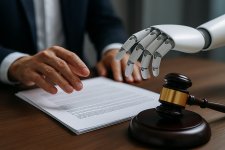The legal profession, often seen as tradition-bound and human-centric, is facing a silent but powerful disruption—artificial intelligence (AI). From automating routine tasks to assisting in decision-making, AI is increasingly finding its place in legal workflows. This raises a crucial question: Can AI truly replace lawyers, or is this another exaggerated fear of technology?
In today’s law firms and corporate legal departments, AI is no longer a futuristic concept—it’s a functional tool. Applications like ROSS Intelligence, LexisNexis, and Kira Systems are transforming legal research, contract analysis, and due diligence processes. Tasks that once consumed hours of a junior associate’s time are now completed within minutes with greater accuracy and fewer errors. Judiciaries in countries like China and the UAE have even experimented with AI-assisted judges for routine cases. India has recently initiated projects exploring AI integration in judicial functions, such as case prediction models and digital transcription systems.
Despite its growing capabilities, AI has significant limitations that prevent it from replacing human lawyers entirely. Law is not just about analyzing precedents or applying statutes—it’s about context, interpretation, and human judgment. Client counseling requires empathy, cultural awareness, and nuanced understanding of individual concerns—skills no AI has mastered. Negotiation and advocacy demand creativity, persuasion, and spontaneity that algorithms simply cannot replicate. Even in legal drafting, the “human touch”—the ”ability to anticipate risks, adjust tone, and apply legal strategy—remains indispensable.
As AI becomes more embedded in legal processes, it also brings ethical and regulatory dilemmas. Data privacy concerns arise when sensitive client information is fed into AI systems. Bias in AI algorithms has been observed in criminal justice systems, where flawed training data perpetuate discrimination. Most importantly, accountability becomes murky—if AI gives incorrect advice, who is responsible: the developer, the lawyer, or the machine? Current legal frameworks are still catching up to these issues, and many jurisdictions have no specific laws regulating AI in legal practice. This legal vacuum presents both a risk and an opportunity for forward-thinking regulators and technologists.
Instead of fearing AI as a job-killer, lawyers should see it as an opportunity to elevate their roles. AI can handle the grunt work, leaving legal professionals free to focus on complex reasoning, strategy, and advocacy. The legal education system is slowly adapting. Law schools worldwide are beginning to offer courses in legal technology, data analytics, and AI ethics, preparing future lawyers to work alongside machines rather than be replaced by them. New roles such as legal tech consultants, AI compliance officers, and ethics auditors are emerging, offering exciting career paths for legal professionals who embrace the shift.
While AI is set to revolutionize legal practice, it is unlikely to fully replace lawyers. The profession is evolving, not disappearing. As the old adage goes, “AI won’t replace lawyers—but lawyers who use AI will replace those who don’t.” By combining technological efficiency with human judgment, the future of law lies not in man versus machine, but in man plus machine.
In today’s law firms and corporate legal departments, AI is no longer a futuristic concept—it’s a functional tool. Applications like ROSS Intelligence, LexisNexis, and Kira Systems are transforming legal research, contract analysis, and due diligence processes. Tasks that once consumed hours of a junior associate’s time are now completed within minutes with greater accuracy and fewer errors. Judiciaries in countries like China and the UAE have even experimented with AI-assisted judges for routine cases. India has recently initiated projects exploring AI integration in judicial functions, such as case prediction models and digital transcription systems.
Despite its growing capabilities, AI has significant limitations that prevent it from replacing human lawyers entirely. Law is not just about analyzing precedents or applying statutes—it’s about context, interpretation, and human judgment. Client counseling requires empathy, cultural awareness, and nuanced understanding of individual concerns—skills no AI has mastered. Negotiation and advocacy demand creativity, persuasion, and spontaneity that algorithms simply cannot replicate. Even in legal drafting, the “human touch”—the ”ability to anticipate risks, adjust tone, and apply legal strategy—remains indispensable.
As AI becomes more embedded in legal processes, it also brings ethical and regulatory dilemmas. Data privacy concerns arise when sensitive client information is fed into AI systems. Bias in AI algorithms has been observed in criminal justice systems, where flawed training data perpetuate discrimination. Most importantly, accountability becomes murky—if AI gives incorrect advice, who is responsible: the developer, the lawyer, or the machine? Current legal frameworks are still catching up to these issues, and many jurisdictions have no specific laws regulating AI in legal practice. This legal vacuum presents both a risk and an opportunity for forward-thinking regulators and technologists.
Instead of fearing AI as a job-killer, lawyers should see it as an opportunity to elevate their roles. AI can handle the grunt work, leaving legal professionals free to focus on complex reasoning, strategy, and advocacy. The legal education system is slowly adapting. Law schools worldwide are beginning to offer courses in legal technology, data analytics, and AI ethics, preparing future lawyers to work alongside machines rather than be replaced by them. New roles such as legal tech consultants, AI compliance officers, and ethics auditors are emerging, offering exciting career paths for legal professionals who embrace the shift.
While AI is set to revolutionize legal practice, it is unlikely to fully replace lawyers. The profession is evolving, not disappearing. As the old adage goes, “AI won’t replace lawyers—but lawyers who use AI will replace those who don’t.” By combining technological efficiency with human judgment, the future of law lies not in man versus machine, but in man plus machine.

